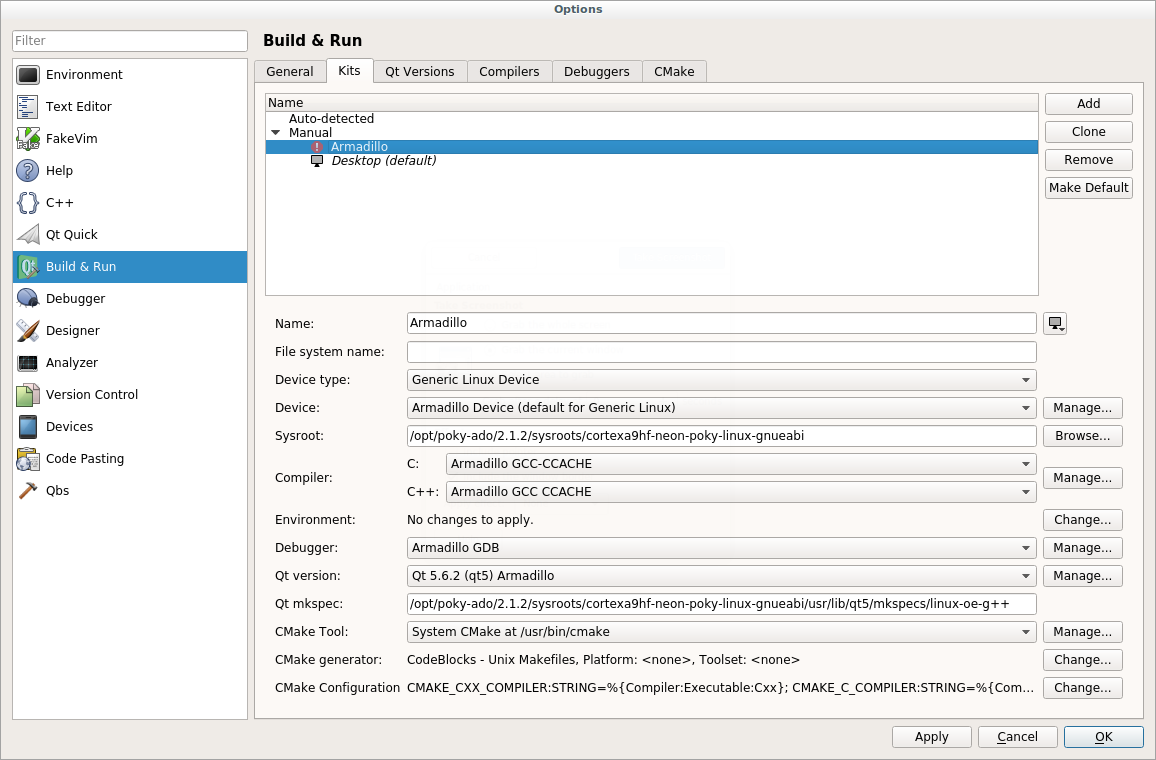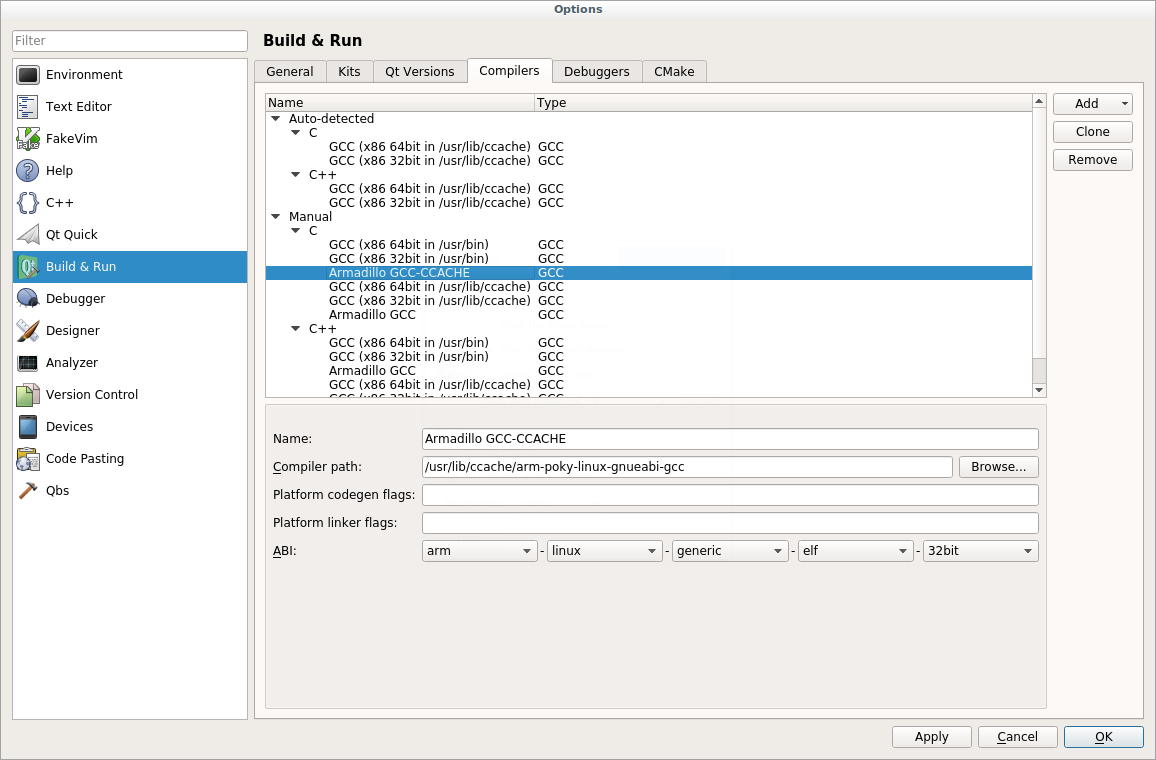Speeding Up Native Compiling and Cross-Compiling Time with ccache
It took me years to finally realize that I could greatly speed up compilation time using a utility called ccache.
It is essentially a wrapper around your compiler, most likely g++, that caches the compiled objects from your source and saves them in your home directory (.ccache folder) so that subsequent builds with the identical environment settings will use the cache. Not using it is pretty much wasting time. Sourcing an environment script that changes any compiler flags or targets that are different from the already compiled objects from the same source files in prior builds will inflict a “cache miss”.
To install: sudo apt-get install ccache
ccache includes the compiler name in the hash as shown in the manual, making it safe for multiple architectures to use ccache.
Native Compiling
In your .bash_rc file or similar, place: export PATH=/usr/lib/ccache:$PATH
Run which gcc to ensure that it is pointing at ccache. The paths that show up first in the variable are parsed first - a “first come first served” situation.
To verify operation and see the cache grow in size, start compiling something and invoke the following:
jbauer@ad-dell:~$ watch -n 1 ccache -s
Every 1.0s: ccache -s Thu Apr 13 14:32:22 2017
cache directory /home/jbauer/.ccache
primary config /home/jbauer/.ccache/ccache.conf
secondary config (readonly) /etc/ccache.conf
cache hit (direct) 56
cache hit (preprocessed) 0
cache miss 1991
called for link 369
no input file 2
files in cache 4217
cache size 962.5 MB
You can also just use this to print out the stats directly: jbauer@ad-dell:~$ ccache -s
Cross-Compiling (Using Yocto)
Similar methodology can be used to have your cross-compilers utilize ccache. I’m usually using Yocto, which creates an SDK for your target and contains an environment script that I can then source and begin compilation for the embedded target.
- Install the Yocto supplied SDK after bitbaking it.
- Open your environment script and find the name of your cross-compiler. My location was:
/opt/poky/2.1.2/environment-setup-cortexa9hf-neon-poky-linux-gnueabi. The compiler name is then found under theexport CC=line. -
Create two soft links in your
ccachedirectory$ cd /usr/lib/ccache $ ln -s /usr/bin/ccache arm-poky-linux-gnueabi-g++ $ ln -s /usr/bin/ccache arm-poky-linux-gnueabi-gcc -
Re-open your environment script and prepend
/usr/lib/ccachein thePATHvariable. This ensures that your machine will first look in yourccachedirectory for the compilers. Omitting this step will require you to manually export the PATH variable after sourcing the script or elseccachewill never do its job.export PATH=/usr/lib/ccache:/opt/poky/2.1.2/sysroot/.... -
Edit your
conf/local.conffile and append this to the end of the fileINHERIT += "ccache" CCACHE_DIR = "/home/<username>/.ccache" -
Verify your work
$ ls -al lrwxrwxrwx 1 root root 16 Apr 13 13:25 arm-poky-linux-gnueabi-g++ -> ../../bin/ccache lrwxrwxrwx 1 root root 16 Apr 13 13:25 arm-poky-linux-gnueabi-gcc -> ../../bin/ccache lrwxrwxrwx 1 root root 16 Mar 21 12:24 c++ -> ../../bin/ccache lrwxrwxrwx 1 root root 16 Mar 21 12:24 c89-gcc -> ../../bin/ccache lrwxrwxrwx 1 root root 16 Mar 21 12:24 c99-gcc -> ../../bin/ccache lrwxrwxrwx 1 root root 16 Mar 21 12:24 cc -> ../../bin/ccache lrwxrwxrwx 1 root root 16 Mar 21 12:24 g++ -> ../../bin/ccache lrwxrwxrwx 1 root root 16 Mar 21 12:24 g++-5 -> ../../bin/ccache lrwxrwxrwx 1 root root 16 Mar 21 12:24 gcc -> ../../bin/ccache lrwxrwxrwx 1 root root 16 Mar 21 12:24 gcc-4.8 -> ../../bin/ccache lrwxrwxrwx 1 root root 16 Mar 21 12:24 gcc-5 -> ../../bin/ccache lrwxrwxrwx 1 root root 16 Mar 21 12:24 x86_64-linux-gnu-g++ -> ../../bin/ccache lrwxrwxrwx 1 root root 16 Mar 21 12:24 x86_64-linux-gnu-g++-5 -> ../../bin/ccache lrwxrwxrwx 1 root root 16 Mar 21 12:24 x86_64-linux-gnu-gcc -> ../../bin/ccache lrwxrwxrwx 1 root root 16 Mar 21 12:24 x86_64-linux-gnu-gcc-4.8 -> ../../bin/ccache lrwxrwxrwx 1 root root 16 Mar 21 12:24 x86_64-linux-gnu-gcc-5 -> ../../bin/ccache -
Bitbake something and watch it hit your ccache
bitbake gcc watch -n 1 ccache -s
Please note that any cleans (bitbake gcc -c cleanall) will completely erase the contents in your ccache directory - even unrelated files. I was not able to determine why this is so. You should also be leveraging Yocto’s built-in sstate-cache which negates the majority of the need for ccache.
Setting up QtCreator
You can utilize ccache inside of QtCreator by selecting your native and cross-compiler links inside of the ccache directory. Below shows two screenshots of setting up my cross-compiler. Notice how I had to manually locate both gcc and g++ and instruct Qt what they are targeting. Your paths will differ slightly since I have my project defined as “Armadillo” or “ado”.


Be sure to source your environment before launching QtCreator!
Leave a Comment
Your email address will not be published. Required fields are marked *
Note - Sometimes a comment submission will fail. Simply press the "Submit Comment" button again until a green success box is shown